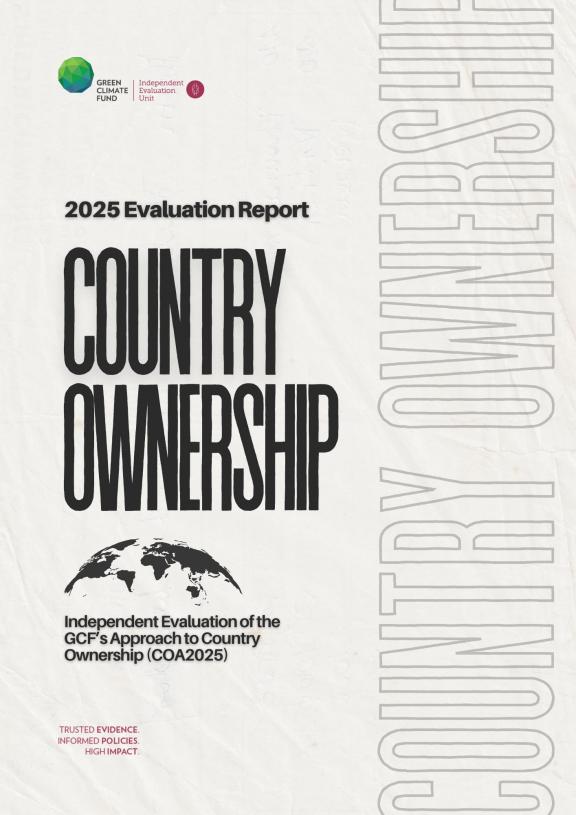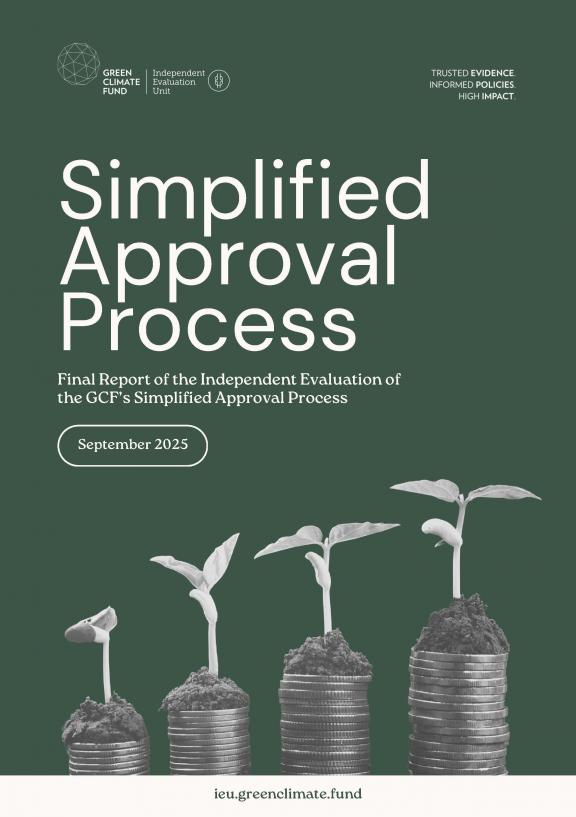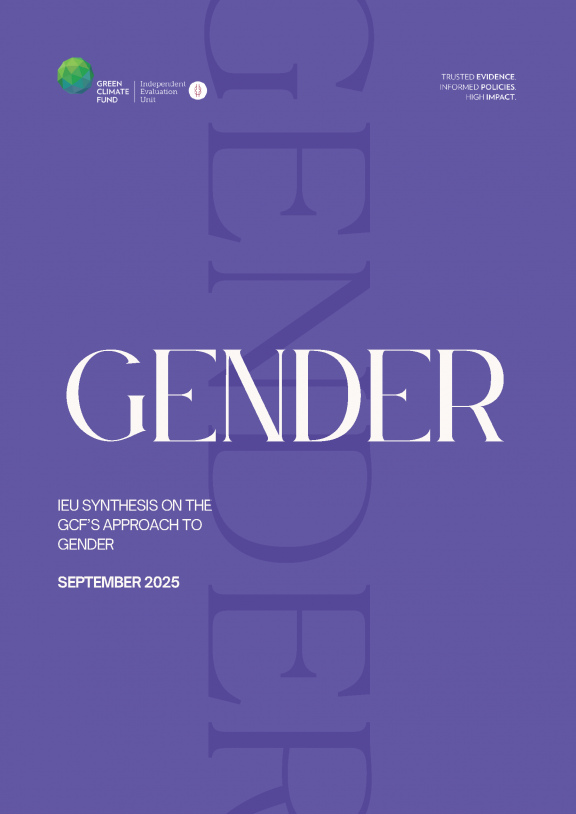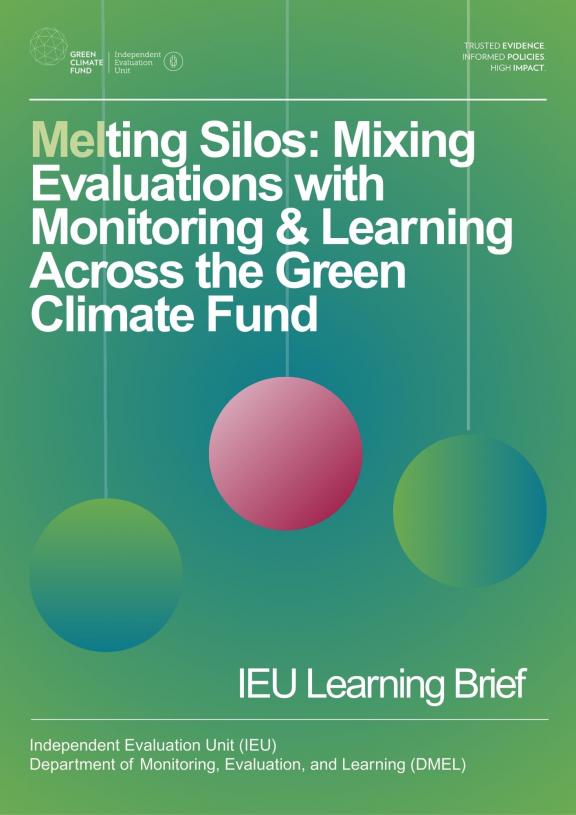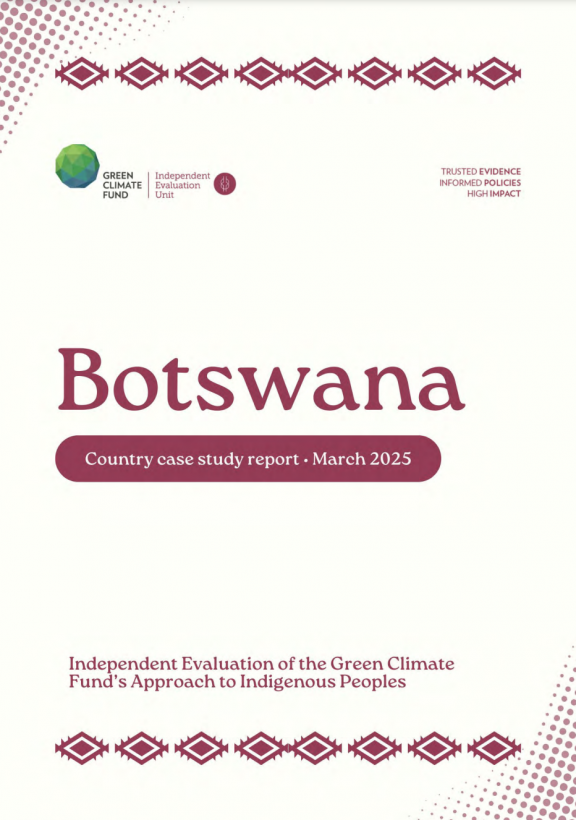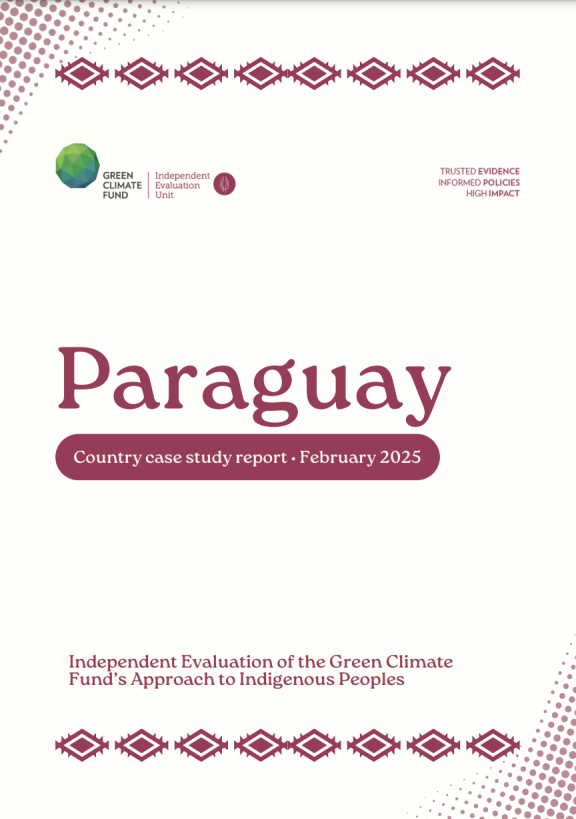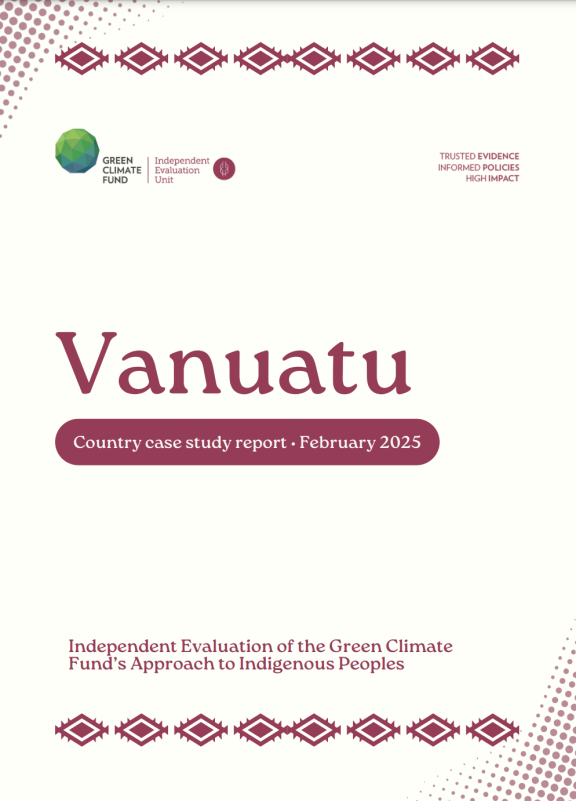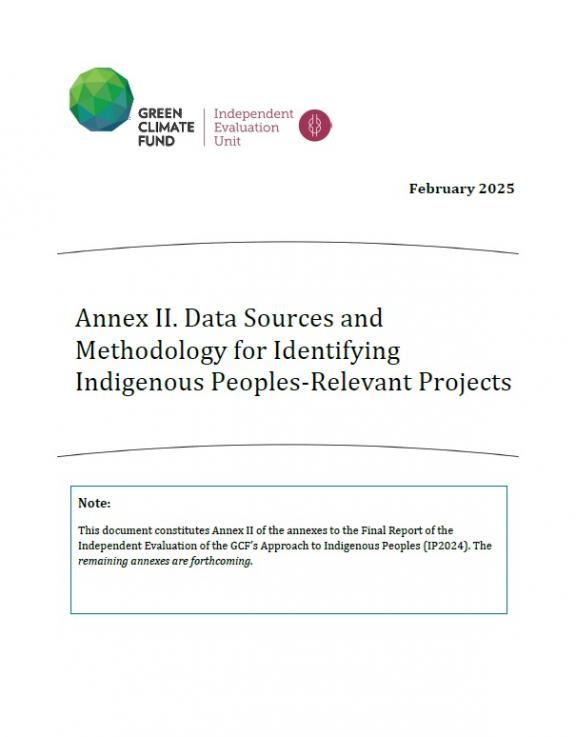IEU publications
IEU publications
To serve the needs of our stakeholders, the IEU issues a variety of publications related to our work, including in the context of evaluations and learning. Keep up with the IEU’s latest publications here.
Featured publications
Independent Evaluation of the GCF's Approach to Country Ownership (COA2025)
This independent evaluation of the Green Climate Fund’s (GCF) approach to country ownership was approved by the GCF Board as part of the 2025 workplan of the Independent Evaluation Unit (IEU) and is submitted in time for its forty-third meeting (B
Independent Evaluation of the GCF’s Simplified Approval Process (SAP2025)
The Green Climate Fund’s Simplified Approval Process (SAP) was created to make climate finance more accessible and responsive, thus enabling smaller, lower-risk projects to address urgent climate needs in vulnerable countries.
Independent Synthesis of the GCF’s Gender Approach
Approved at the fortieth meeting of the GCF Board (B.40), this formative Gender Synthesis consolidates insights from past evaluations, assessments, and studies to inform the forthcoming Independent Evaluation of the GCF’s Gender Approach.
MELting Silos: Mixing Evaluations with Monitoring & Learning Across the Green Climate Fund
This IEU Learning Brief, prepared jointly by the Independent Evaluation Unit (IEU) and the Department of Monitoring, Evaluation, and Learning (DMEL), examines how the Green Climate Fund (GCF) can better align its monitoring, evaluation, and learni
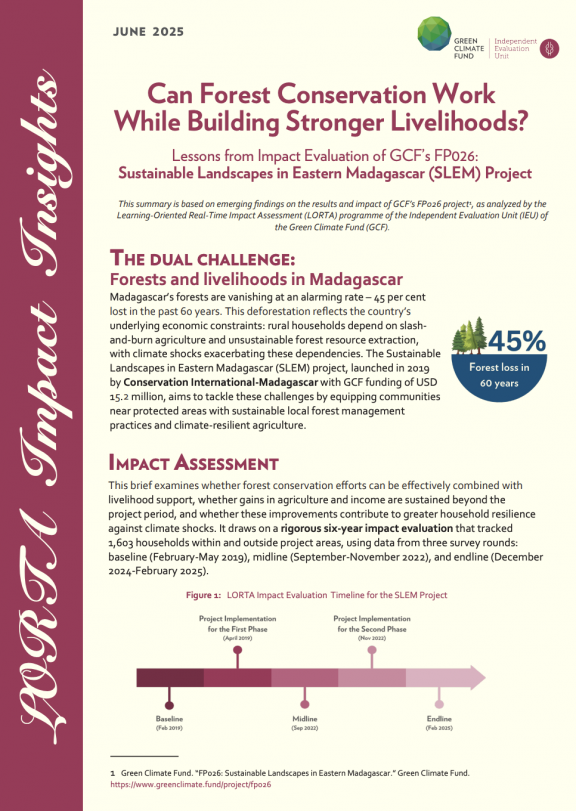
Impact Insights: Can Forest Conservation Work While Building Stronger Livelihoods?
June 2025
This Impact Insights brief presents emerging findings from the six-year impact evaluation of GCF’s FP026 project in Madagascar. Conducted under the IEU’s LORTA programme, the study explores how forest conservation efforts can align with improved livelihoods and resilience. The brief highlights reductions in deforestation, income gains from climate-resilient crops, and the importance of sustained support systems, especially for female-headed households.
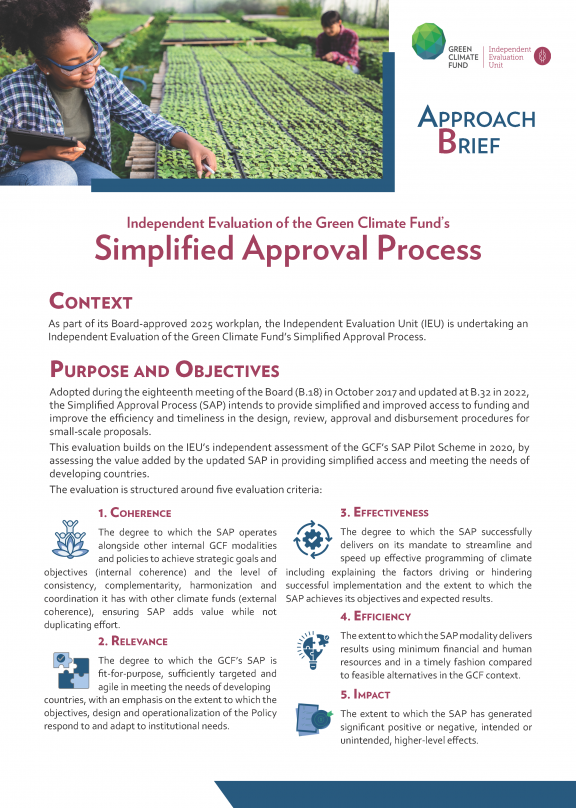
Approach Brief: Independent Evaluation of the Green Climate Fund’s Simplified Approval Process
June 2025
This brief summarizes the approach paper for the Independent Evaluation of the GCF’s Simplified Approval Process (SAP) modality. It outlines the evaluation’s context, purpose, objectives, scope, methodology, and timeline.
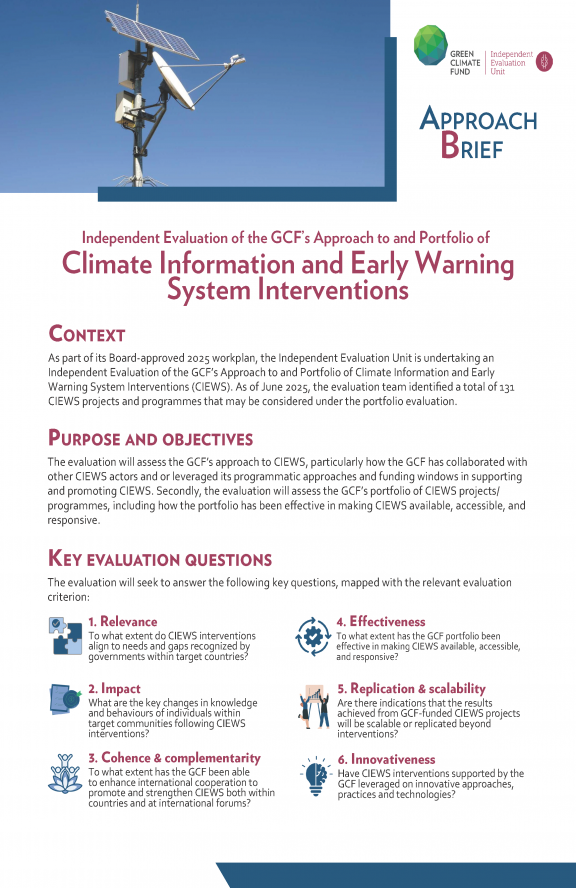
Approach Brief: Independent evaluation of the GCF’s approach to and Portfolio of Climate Information and Early Warning System Interventions
June 2025
This brief summarizes the approach for the Independent Evaluation of the GCF’s Approach to and Portfolio of Climate Information and Early Warning System (CIEWS) Interventions. It outlines the evaluation’s context, objectives, scope, methodology, timeline, and deliverables.
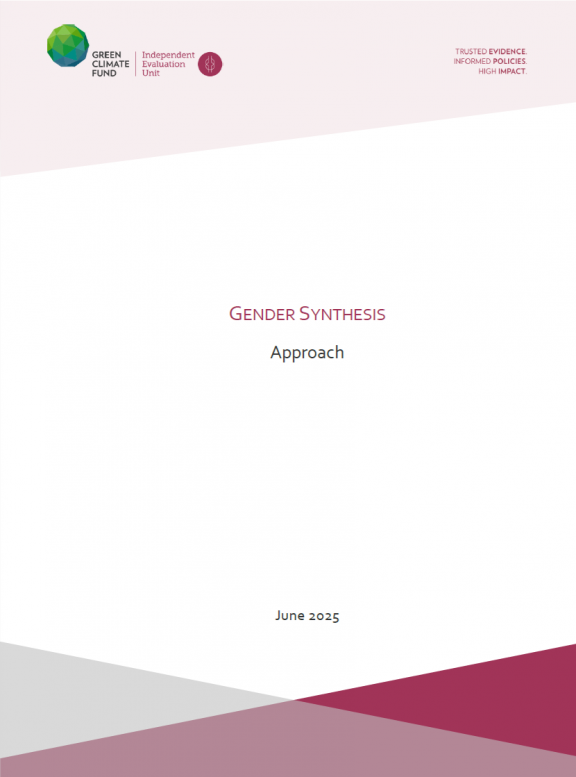
Gender Synthesis: Approach
June 2025
This paper presents the proposed approach for conducting a Synthesis of the Green Climate Fund’s (GCF) Gender Approach. Informed by initial stakeholder consultations and a review of key documents, the paper outlines the objectives, scope, and methodology for assessing how gender considerations are integrated into GCF’s operations and projects. It also provides a roadmap of planned activities, deliverables, and timelines for the Gender Synthesis, which aims to inform future improvements in...
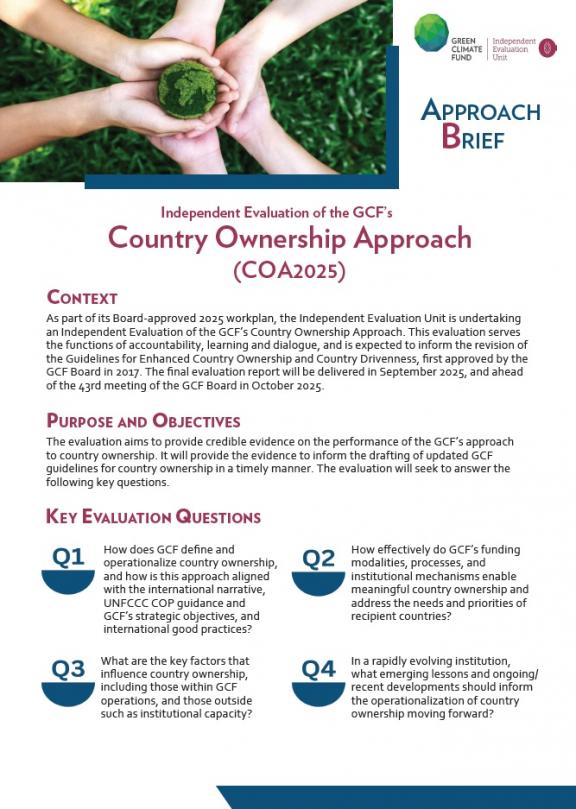
COA2025: Approach Brief
May 2025
Country ownership is central to the GCF’s efforts to promote low-emission and climate-resilient development. This evaluation will support learning and accountability on how the GCF promotes country ownership in its operations. This 2-page approach brief outlines the context, purpose, scope, evaluation questions, timeline, and methods for the Independent Evaluation of the GCF’s Country Ownership Approach (COA2025). The evaluation will inform the planned update of the GCF’s Guidelines for...
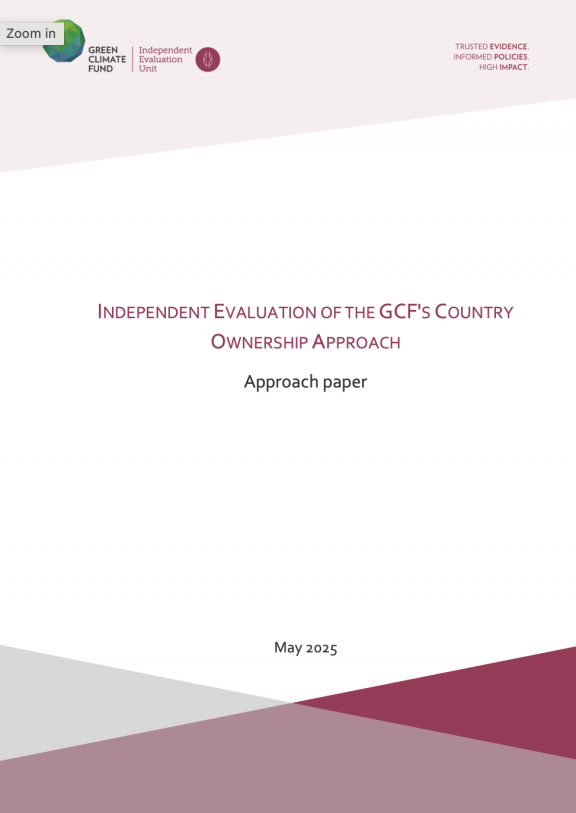
COA2025: Approach paper for the Independent Evaluation of the GCF's Approach to Country Ownership
May 2025
This approach paper outlines the plan for the Independent Evaluation of the GCF’s Country Ownership Approach. Approved by the GCF Board at its 40th meeting, the evaluation will assess how effectively the Fund’s country ownership approach has been operationalized and will provide timely evidence to inform an update to the country ownership guidelines in 2025. It details the evaluation’s background, scope, questions, methodology, and timeline.
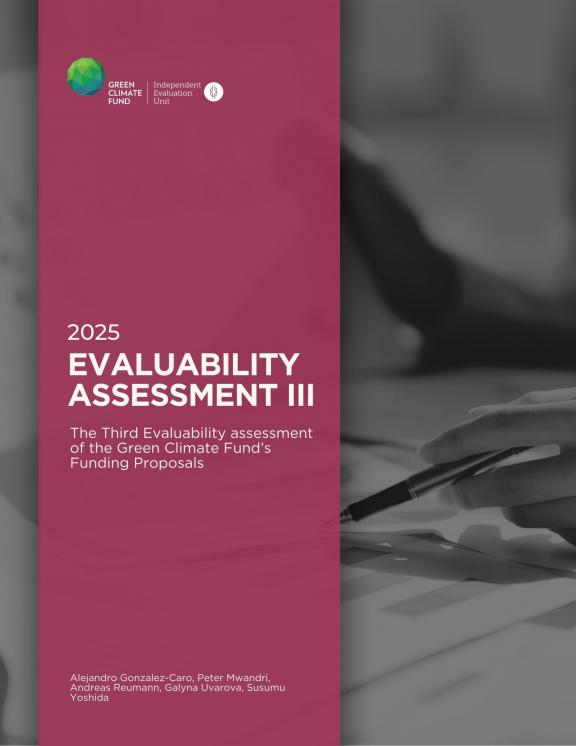
The Third Evaluability assessment of the Green Climate Fund’s Funding Proposals
May 2025
This report presents the third evaluability study conducted by the Independent Evaluation Unit (IEU) of the Green Climate Fund (GCF). The study assesses whether GCF projects and programmes can be evaluated in a reliable and credible manner. It analyses a sample of 20 funding proposals (FPs) approved between B.26 and B.30, providing findings on the evaluability of logical frameworks, indicators, and result measurement systems across various sectors and geographic regions.
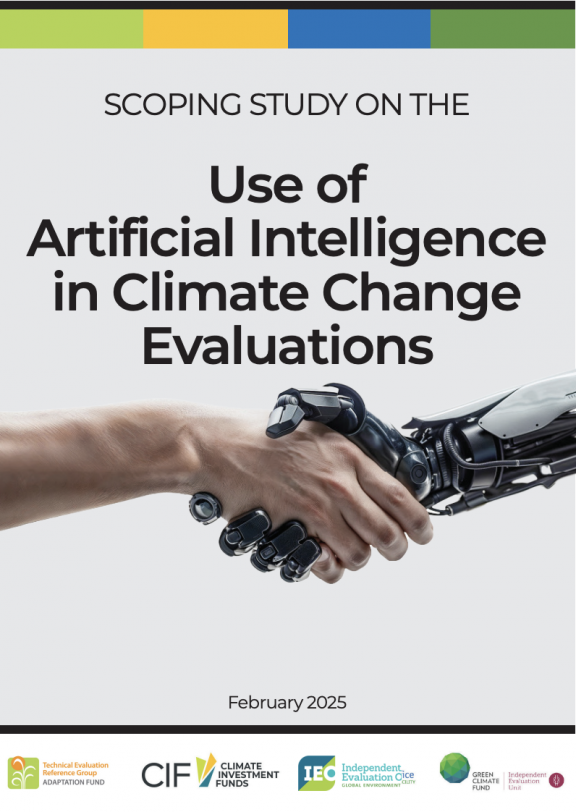
Scoping Study on the Use of Artificial Intelligence in Climate Change Evaluations
April 2025
Commissioned by the evaluation units of the Adaptation Fund, CIF, GEF, and GCF, this 2025 study explores the potential of AI to enhance the quality, efficiency, and impact of climate change evaluations. It examines current applications, risks, and future opportunities of AI across all stages of the evaluation process. Through a literature review, interviews, and a global survey, the study provides practical insights and recommendations to guide evaluation stakeholders in responsibly integrating...
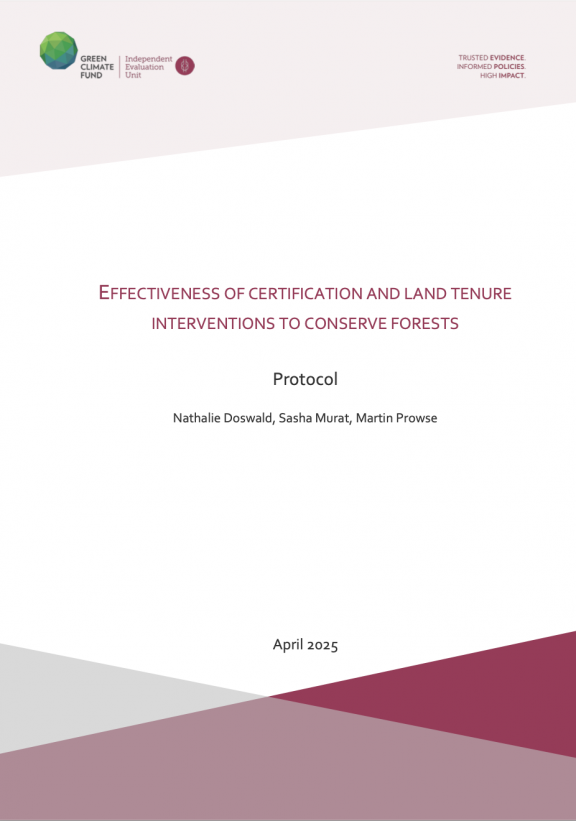
Effectiveness of Certification and Land Tenure Interventions to Conserve Forests
April 2025
This protocol outlines the methodology for an evidence review on the effectiveness of certification and land tenure interventions in conserving forests. It details the research questions, inclusion criteria, search strategy, data extraction and analysis plan. The review aims to inform future decision-making by synthesizing available evidence on how these interventions impact forest conservation outcomes.
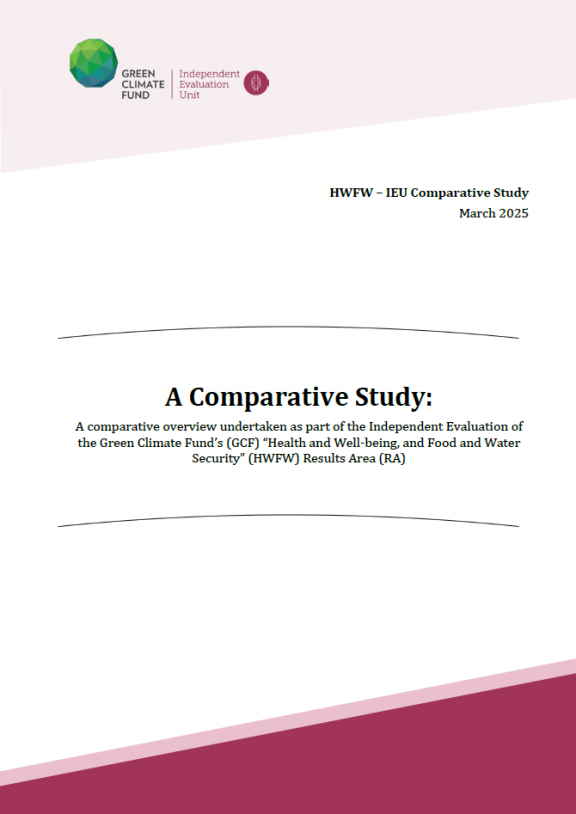
A Comparative Study: A comparative overview undertaken as part of the Independent Evaluation of the Green Climate Fund’s (GCF) “Health and Well-being, and Food and Water Security” (HWFW) Results Area (RA)
March 2025
This analysis examined the actual and potential achievements of GCF investments tagged under the Health and Well-being, and Food and Water Security (HWFW) Results Area (RA), identifying key factors that enable or constrain progress, and assessing the overall value of the Fund’s RA approach and portfolio. The study employed a mixed-method approach, including document and portfolio review, stakeholder consultations, field visits, and a benchmarking exercise. Through this process, the importance...
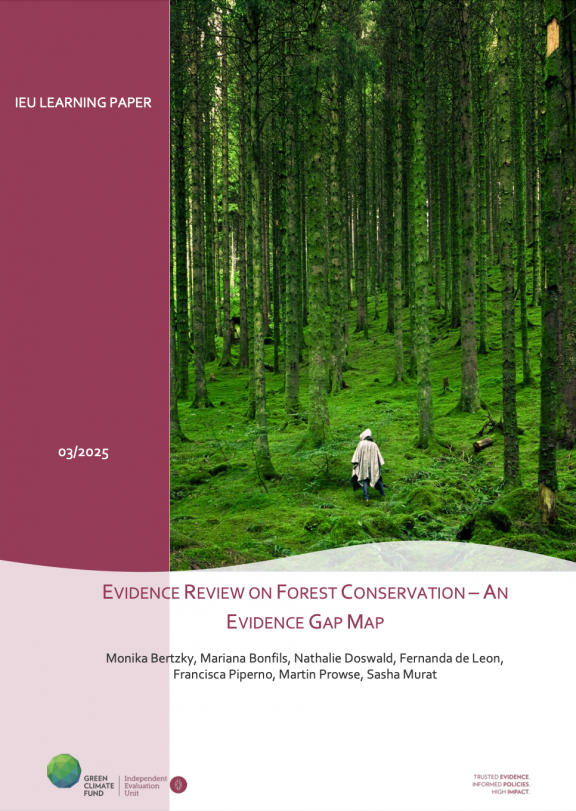
Evidence Review on Forest Conservation – An Evidence Gap Map
March 2025
This report presents an evidence gap map summarizing the available evidence on certification and land tenure interventions to conserve forests in developing countries. It identifies areas with strong evidence and highlights critical gaps where further research is needed. The map supports decision-making for climate and forest policy by showing where interventions have been studied and what outcomes they influence.
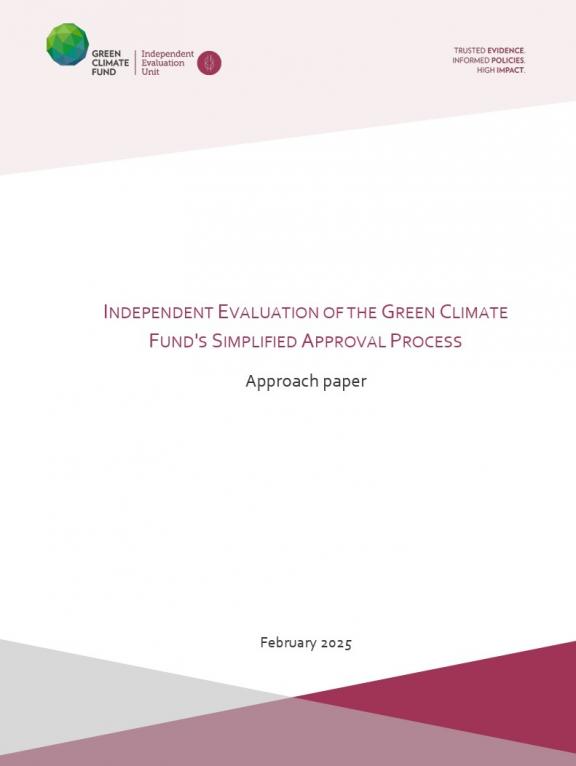
Approach Paper: Independent Evaluation of the GCF’s Simplified Approval Process (SAP2025)
February 2025
The Simplified Approval Process (SAP), adopted by the GCF Board in 2017 (B.18) and updated in 2022 (B.32), aims to streamline funding access for small-scale climate projects, enhancing efficiency in approval and disbursement. Building on the IEU’s 2020 assessment of the SAP Pilot Scheme, this 2025 evaluation examines how effectively the updated SAP delivers simplified access and meets developing countries' needs. This approach paper outlines the evaluation’s methodology, key questions, timeline...
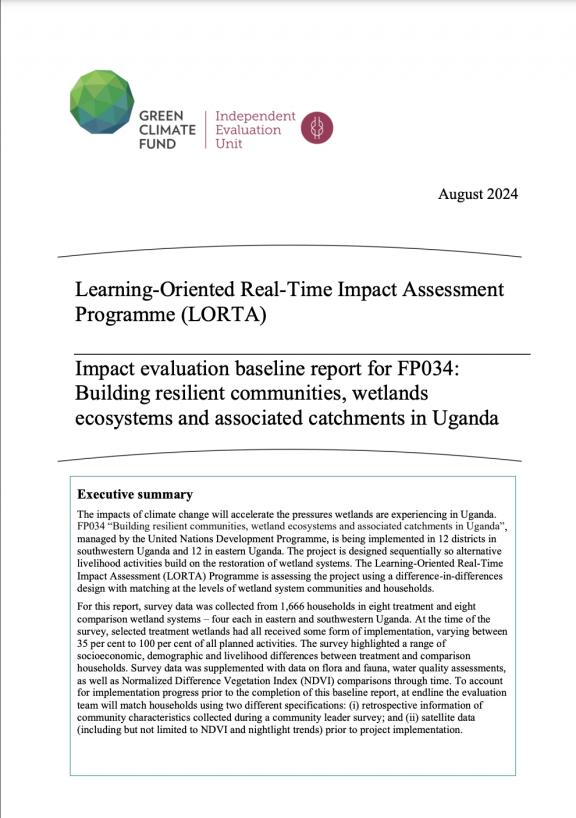
Impact evaluation baseline report for FP034: Building resilient communities, wetlands ecosystems and associated catchments in Uganda
February 2025
This baseline report evaluates FP034, a wetland restoration and community resilience project in Uganda, implemented by the United Nations Development Programme (UNDP). Assessed under the Learning-Oriented Real-Time Impact Assessment (LORTA) Programme, the study uses a difference-in-differences design with matching to measure project impact. Data was collected from 1,666 households across treatment and comparison wetland systems in eastern and southwestern Uganda, alongside flora and fauna...
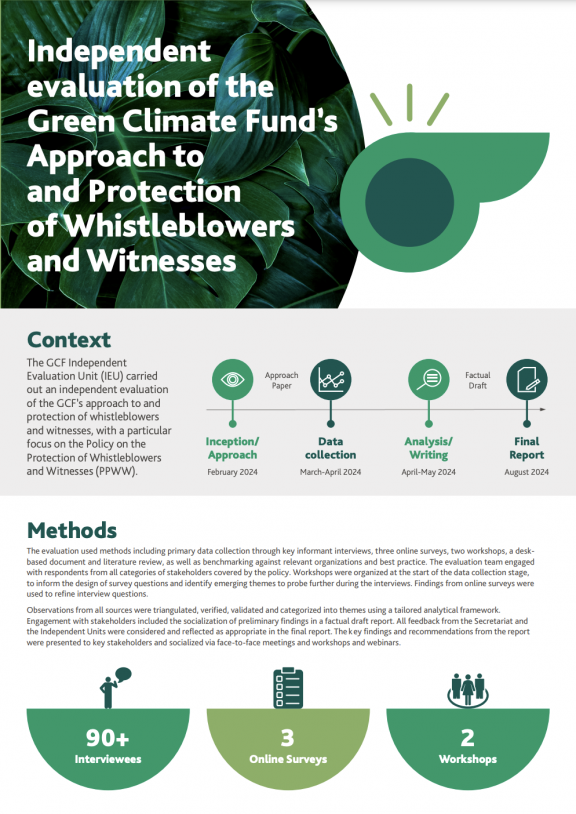
Infographic (PPWW2024)
February 2025
This infographic presents key findings and recommendations from the Independent Evaluation of the Green Climate Fund’s Approach to and Protection of Whistleblowers and Witnesses (PPWW2024). It highlights insights from surveys, interviews, and stakeholder consultations on the effectiveness, awareness, and implementation of the GCF’s whistleblower protection policy.
